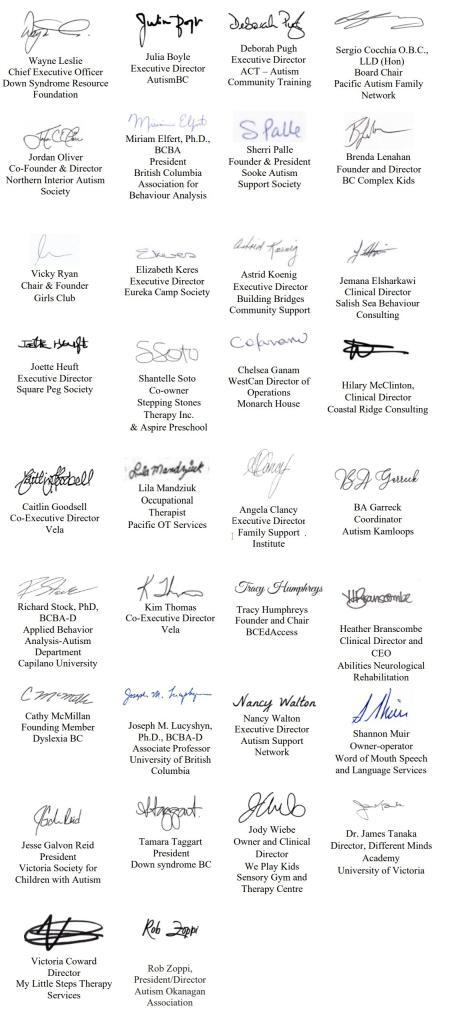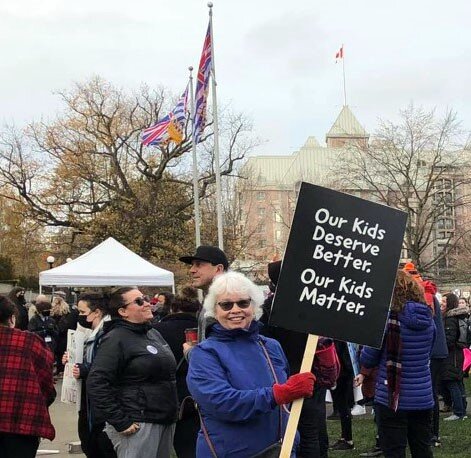34 Disability Organizations Unite for Letter to Minister Dean Regarding CYSN Framework
“Though we represent different disabilities and diverse approaches to
supporting children, youth, and families, we are in broad agreement on
what we believe are shortcomings in MCFD’s process and proposed plan
for Family Connection Hubs.”

Thirty-four organizations supporting families across disabilities from around the province have united for a letter to MCFD Minister Mitzi Dean. The letter expresses shared concerns about the proposed framework for Children and Youth with Support Needs (CYSN) services, including the lack community consultation and transparency, issues with needs-assessment tools, insufficient levels of qualified service providers, and the loss of family autonomy to choose the services their children receive.
December 3, 2021
Honourable Mitzi Dean
Ministry of Children & Family Development
PO Box 9724 Stn. Prov Govt
Victoria, BC V8W 9S2
RE: MCFD System Changes for Children and Youth with Disabilities
Dear Minister Dean,
We (the undersigned) cumulatively represent 34 BC-based organizations, as well as clinicians, researchers, and businesses with hundreds of years of combined experience supporting tens of thousands of children and youth with disabilities and complex needs. We are jointly writing this letter to express our concerns with the Ministry of Children and Family Development’s (MCFD) sudden decision to transform the existing support network for children and youth with disabilities to a system of generalist hubs while simultaneously eliminating individualized funding.
As a group, we are certainly pleased to hear that MCFD is committed to ensuring all children will finally have equitable access to disability supports and services—including those who live outside major population centres—and that this support will be available with or without a diagnosis. Collectively, we agree that the current system is in dire need of change, particularly when it comes to ensuring equitable and adequate funding for all neurodivergent and disabled children. There are currently far too many underserved individuals, families, and communities throughout BC. We share MCFD’s ambition to reach these populations with essential services that are necessary for all children, youth, and families in this province to thrive.
Though we represent different disabilities and diverse approaches to supporting children, youth, and families, we are in broad agreement on what we believe are shortcomings in MCFD’s process and proposed plan for Family Connection Hubs.
There has been an acute lack of meaningful engagement and collaboration with our community regarding changes to the Children and Youth with Support Needs (CYSN) Framework. Although MCFD claims to have conducted consultations prior to announcing the new system, none of our organizations were invited to or included in these discussions in any meaningful way, if at all. The announcement of these major funding changes has caught the majority of BC’s disability community by surprise, as the recent statement from the Representative for Children and Youth also describes. As you know, the First Nations Leadership Council does not support the changes you have announced, nor the process you have undertaken. Consultation with Indigenous leaders and communities is necessary to reconciliation given the disproportionately high rates of Indigenous children and teens in MCFD’s foster care system.
There continues to be a lack of transparency about the changes to the CYSN Framework. The initial announcement included big promises but few details. Subsequent information releases have failed to reveal further insight into how the hubs will provide more support compared to the current system. Like Dr. Jennifer Charlesworth, we are especially concerned with the lack of clear plans to significantly increase funding or increase the number of service providers within the proposed hub model. Since the funding change announcement, all of our organizations have been inundated with questions from concerned parents and community members–questions that we can’t answer due to the scarcity of information from MCFD. Unfortunately, this lack of transparency and clarity continues even after information sessions were held this week for families, service providers, and sector partners.
Changes to the CYSN Framework should be guided by principles such as flexibility, choice, equity, access, cultural safety, trauma-informed practices, empowerment, and dignity. As disability organizations, we know from experience how vital it is for families to have agency and autonomy over the services their children receive and the supports they need. These benefits are a critical element that is missing from the proposed plan. For this reason, a hybrid model would better meet families’ diverse circumstances by allowing a variety of ways to access services, funding, and support, avoid disruption of already established supports and minimize the need to jump through unnecessary hoops or seek additional diagnoses. Rather than minimizing the role of diagnosis, waitlists for diagnostic assessment must be shortened to a maximum of three months and efficiencies in the public assessment system must be created. Additionally, eligibility must be streamlined for all disabilities, ensuring all children receive time-sensitive early intervention supports during their most critical years of development, even while waiting for a diagnosis. Families shouldn’t have to prove that they deserve financial, social, and political support for their disability-related needs, nor should they have to continuously prove need or eligibility when their disability is genetic or lifelong.
There is also much concern about the proposed needs-assessment tools. More robust consultation needs to be done to ensure that the tools being used to assess needs will not cause harm or exclude children and families from supports and services they need. We feel that assessors should not serve as gatekeepers but instead open the door to exceptional support for all children and youth who need it. We are concerned the hubs will not accomplish the latter.
Supporting all children will require accurate data on the number of children and youth that require supports. The province has not shared a true reflection of the population that will be served. While the government speaks of serving an additional 8,300 children, we know that is not an accurate number representing the need. Thus, service providers and modelling are needed to understand the full extent of this gap today and in the future.
Currently, there are not even enough service providers to meet the needs of all children and youth currently accessing CYSN services. We need more pediatricians, speech-language pathologists, occupational therapists, physical therapists, psychologists, behaviour analysts, and other support professionals who work directly with children with disabilities throughout the province. Without more of these essential professionals and access to services, especially in rural communities, supports will remain constrained with or without a hub system. Service providers with unique expertise in a specific disability or support need represent one of the province’s most valuable assets. These specialists have the knowledge and experience to offer targeted, individualized support that cannot be matched by a hub that caters to all disabilities. Families are deeply concerned that they will receive generic services at a hub that lack this depth of knowledge about their child’s specific disability. We also can’t assume that all service providers will be culturally safe for all children, youth, and families. Families must have the option to choose service providers to build on strengths and prevent harm and trauma. This may require them to be at arms-length from MCFD.
As concerned stakeholders, we share the objectives that the proposed MCFD plan intends to achieve, especially in terms of supporting families that are underfunded or completely without government funding. We particularly welcome the objective of guaranteeing support for those without a diagnosis. Therefore, a hub system may be an appropriate complement in creating a hybrid system that maintains individualized funding for the families for whom it’s already working and expands this option to include all families as a choice. To this end, MCFD must invest substantially more funding into the CYSN Framework to meet the needs of all children and youth with support needs and to avoid reproducing the pitfalls of the Ontario model, in which 50,000 children await access to promised needs-based supports.
We call on MCFD to immediately extend more funding to all children with disabilities, with or without a diagnosis. A failure to do so will continue to push unfunded families beyond their breaking points.
We also call on MCFD to immediately engage and collaborate with the undersigned in the restructuring and decision-making process of the proposed service system.
Respectfully,

Cc: Hon. John Horgan, Premier and President of the Executive Council, and MLA for Juan de Fuca: [email protected] & [email protected]
Ms. Allison Bond, Deputy Minister, MCFD: [email protected]
Ms. Shirley Bond, MLA for Prince George-Valemount, BC Liberal Party Interim Leader and Official Opposition critic for Seniors Services and Long-Term Care, and Health: [email protected]
Ms. Karin Kirkpatrick, MLA for West Vancouver-Capilano and Official Opposition critic for Children, Family Development, and Childcare: [email protected]
Mr. Trevor Halford, MLA for Surrey-White Rock and Official Opposition critic for Mental Health and Additions: [email protected]
Ms. Sonia Furstenau, MLA for Cowichan Valley, Leader of the BC Green Party and House Leader: [email protected]
Ms. Stephanie Cadieux, MLA for Surrey South and Official Opposition critic for Gender, Equity, Accessibility, and Inclusion: [email protected]
Ms. Jackie Tegart, MLA Fraser-Nicola Opposition critic for Education: [email protected]
Mr. Dan Davies, MLA Peace River North, and critic for Social Development & Poverty Reduction: [email protected]
Ms. Teresa Wat, MLA for Richmond Centre and a former member of the Select Standing Committee on Children and Youth: [email protected]
Ms. Melanie Mark, MLA for Mount Pleasant and Minister of Tourism, Arts, Culture and Sport: [email protected]
Ms. Brenda Bailey, MLA for Vancouver-False Creek and Parliamentary Secretary for Technology and Innovation: [email protected]
Mr. David Eby, MLA for Vancouver-Point Grey, Minister Responsible for Housing, and Attorney General: [email protected]
Mr. Ravi Kahlon, MLA for Delta North and Minister of Jobs, Economic Recovery, and Innovation: [email protected]
Ms. Selina Robinson, MLA for Coquitlam-Maillardville and Minister of Finance: [email protected]
Mr. Nicholas Simons, MLA for Powell River-Sunshine Coast and Minister of Social Development and Poverty Reduction: [email protected]
Ms. Anne Kang, MLA for Burnaby-Deer Lake and Minister of Advanced Education and Skills Training: [email protected]
Mr. Mike Farnworth, MLA for Port Coquitlam, Minister of Public Safety, Solicitor General, and Deputy Premier: [email protected]
Murray Rankin, MLA Oak Bay-Gordon Head and Minister of Indigenous Relations and Reconciliation: [email protected]
MCFD’s Consultation Process – Light on transparency, heavy on control
A Statement from Deborah Pugh, ACT’s Executive Director

I have been asked a number of times just what happened at the Minister’s Advisory Council on Children and Youth with Support Needs set up in the Spring of 2021 by MCFD Minister Mitzi Dean. Having signed a non-disclosure agreement, I am not free to provide details. However, I can share my critique of the process which led me to resign in July 2021. [Read my resignation letter]
My expectations of the Council were never high, shaped by 25 years of participating in MCFD’s community consultations in my capacity as a parent, as ACT’s Executive Director and now as the grandmother of a child with a genetic condition. However, I am observing a new low, in terms of MCFD’s willingness to listen to families. The previous Liberal government virtually ignored the needs of children with disabilities and their families, haphazardly and stealthily cutting funding and programs to meet their budgetary goals. In contrast, the NDP government appears determined to dictate to families a whole new system based on “Family Hubs”. Their process negates the diversity of family and child needs and the complexity of system change. This process is being promoted as “‘consultation” but MCFD’s tight control of meetings using Zoom technology, yet another consequence of the pandemic, smacks of a rubber stamp.
In the MCFD session held on November 29th, for example, parents were not permitted to see each other or share comments via the chat in response to what was largely a lecture by MCFD representatives. One parent described the process to me as “putrid”. This degree of control appears to be key to MCFD’s effort to repair the damage done to the tattered reputation of the long promised ‘Framework for Children and Youth with Support Needs’. The rallies, avalanche of protest letters, and the 21,000 signatures now added to the petition presented to the legislature on November 24th, have clearly spooked the government which appears totally unprepared for the degree of outrage their “framework” has ignited.
As Rob Shaw explains in his brilliant analysis, Consultatio post facto, “The NDP has adopted a bad habit of going through the motions of consulting, only to plow ahead regardless of objection or concern.” Shaw points to the searing letter from the First Nation’s Leadership Council which echoes sentiments from across the BC disability community that “Inviting us to your town halls, after you have made your unilateral decision – a decision that is inconsistent with the UN Declaration and not based on any UN Declaration analysis – demonstrated how disastrously off-course your approach is”.
The current consultations can be seen as the third stage of MCFD’s deeply flawed process. The first was in 2019 when families explained in a series of meetings how their children were being denied therapy to address their disabilities and families were struggling without respite. Many expressed that the current system is not working. An overview of the concerns can be seen here. The assumption that all families want and need the same supports is reflected in the final statement: “Families regard a one-stop, hub infrastructure as ideal.” Given the current level of protest, that is clearly an inaccurate statement.
The second phase of MCFD efforts to create a community consultation ‘paper trail’ followed the first year of the pandemic in Spring 2021. Throughout the pandemic, MCFD’s senior staff and former Minister Katrine Conroy were harshly criticized for their failure to support families dependent on CYSN services, as revealed by researchers from Simon Fraser University. Following the re-election of the NDP government with a majority, Mitzi Dean was appointed as the new MCFD Minister. Ms. Dean, whose background includes being a child protection social worker, quickly moved to create the Minister’s Advisory Council on Children and Youth with Support Needs. The Council members were a group of committed not-for-profit leaders and parents of children with a range of disabilities who struggled to provide a reality check to government.
Beginning in May 2021, I was a member of the Minister’s Advisory Council. Minister Dean attended, backed by a large number of MCFD staffers – few of whom had clinical understanding of children who needed therapeutic/medical supports. MCFD representatives smiled a lot but none of the serious concerns raised penetrated the shell of their conviction that ‘Hubs’ would be the magic bullet for all families and children. It felt like we were listening to an exercise in magical thinking as opposed to a well developed plan of action. I remain frightened at the chaos that this plan, if implemented, will trigger.
In July, I resigned, after a number of sessions in which we received no information on budgets or staffing for these ‘hubs’, despite persistent questions. Cancelling the autism funding programs was never mentioned but as no new funding had been committed, it was obviously central to the plan. Ethically, I could not lend legitimacy to the process by remaining on the Council. I wrote a second letter to Minister Dean on August 9, 2021, again raising concerns and calling for “ethical equity, otherwise the push will be on to remove responsibility for providing therapy to children from MCFD.”
MCFD’s continuing unwillingness to heed warnings from ACT and from many others, demonstrates how resistant senior bureaucrats within MCFD are to the concerns of families struggling to protect their children with disabilities. This has been evident throughout the pandemic. This is a ministry, and a minister, which see families of children with disabilities through the lens of child protection. Even frontline CYSN social workers with expertise in the complexities of providing therapy and support to families of children with disabilities are ignored. Few are left in the higher echelons of the Ministry with this expertise. I don’t think MCFD expected this degree of opposition because they don’t understand the implications of what they are proposing.
Clearly senior bureaucrats, like Deputy Minister Allison Bond, believe they can force a new system on families of children with disabilities. It is ACT’s view that it is time to move families of children with disabilities out of the Ministry of Children and Family Development and to provide CYSN with an expanded stand-alone budget, that is fully funded with cross party support to guard against inflation. Our children deserve no less.
Representative of Children and Youth releases statement on new MCFD Framework
“While a long-term plan is admirable, action is needed now. We believe a fully resourced, short-term strategy by MCFD is required to solve lengthy wait lists for assessments, respite and services until the new system is fully functional.“
The Representative of Children and Youth, Dr. Jennifer Charlesworth, has released a statement addressing the new Ministry of Children and Family Development (MCFD) framework for its Children and Youth with Support Needs (CYSN) program. See the full statement from the Rep below.

Nov. 24, 2021
For Immediate Release
Since the Ministry of Children and Family Development (MCFD) announced long-term plans to fundamentally
change its Children and Youth with Support Needs (CYSN) program, many parents, volunteers and others
who work with children and families have expressed serious concerns about those changes. Sadly, the
announcement has resulted in uncertainty, fear, anxiety and stress for many families, particularly for those
whose children have autism.
At the same time, the announcement was greeted with cautious enthusiasm by other families who saw a
glimmer of hope that they might finally be able to access much-needed supports and care for their children.
Now they, too, are fearful that their children’s needs might not be met if the new CYSN framework is
abandoned, and some have been criticized and shamed on social media as they expressed hope that their
children would finally get supports.
It is time to take a step back to address the uncertainty and fears and ensure clear information is available to
families and advocates, while not losing sight of the need to build a much better system of care for CYSN.
As B.C.’s Representative for Children and Youth, I have long been calling for a fundamental shift in the CYSN
system. Like many others, I have questions and concerns about the framework as announced on Oct. 27.
However, I also see within MCFD’s plan the potential for much-needed and long overdue improvements. In
this regard, I am in favour of the long-term direction as laid out by Minister Mitzi Dean.
In particular, I support the shift towards a needs-based rather than a diagnostically driven CYSN system. This
shift will enable children to receive timely supports based on assessed developmental needs even before
they receive a diagnosis – which currently can take many years. I also support the intention to enhance
community-based access to a diverse array of care and supports, from infancy through to young adulthood.
The minister described the current CYSN system as “patchwork” and said that it leaves too many children on
the outside without services. I couldn’t agree more and, therefore, long-term improvements are absolutely
necessary.
In my three years as Representative, I have released three reports that illuminate the weaknesses in the
current CYSN system. These challenges include lengthy and growing wait lists for assessments and diagnoses,
lack of access to assessments and quality care in many communities, lack of timely developmental supports
to enable young people to thrive, lack of wrap-around support and resources for families who are
endeavouring to meet the exceptional needs of their children, discriminatory screening and referral patterns,
and inequity in services provided depending on a child’s diagnosis.
Through thousands of RCY advocacy cases and reports of critical injuries and deaths, as well as through deep
engagement with young people, families and community partners, we see the extent of the weaknesses in
the current system. While some current CYSN services might be adequate for some children, youth and
families, we know the system as it exists today does not work at all for many. It does not work for children
with fetal alcohol spectrum disorder, with undiagnosed neuro-cognitive developmental disorders, with
complex medical needs or with complex developmental and behavioural concerns. It also does not work well
for many children with autism and their families and caregivers, as we described in our 2018 report entitled
Alone and Afraid.
If we as a society are going to meet the call of Article 23 of the UN Convention on the Rights of the Child,
which speaks to the rights of all children and youth with special needs to access care and support and live a
life of dignity, belonging and connection, then the current system needs to be transformed.
Despite the concerns about the CYSN framework announcement that have been raised during the past few
weeks, I trust that we can all agree on some basic facts and principles: The current CYSN system does not
work for many children with support needs and their families and must be transformed. All children and
youth with support needs deserve access to equitable, timely, culturally attuned and community-based care,
resources and supports. Families, young people, caregivers and service providers need to be meaningfully
engaged in the design and development of a transformed system of care. And, finally, a transformed CYSN
system that works for all children will require significant government investment.
While I support the long-term direction of the CYSN framework, I also share many of the concerns expressed
by families and those in the sector and have a number of questions about the announcement that require
answers in order to ensure that children and families who need support are provided with the confidence
that they will receive it – both now and into the future.
MCFD’s plan is long-term and does nothing to help children and families who are struggling right now. As my
Office documented in our report Left Out last December, many of these children and families are in crisis and
a plan that won’t be fully rolled out for at least 3 ½ years is not enough. The Community Partners we worked
with on that report tell us that things are even worse for the families they serve now, nearly a year after the
Left Out report.
While a long-term plan is admirable, action is needed now. We believe a fully resourced, short-term strategy
by MCFD is required to solve lengthy wait lists for assessments, respite and services until the new system is
fully functional.
Aside from an urgency to address current needs, I am concerned that there has been no indication that
increased resources are on the horizon, which will be critical if the system is to serve more children and
families and do it faster and more effectively. MCFD says its plan will expand services to 8,300 additional
children across B.C. but the ministry does not have the resources to properly serve the children currently on
its caseload.
After three recent RCY reports and one by the Select Standing Committee on Children and Youth that
addressed shortfalls in the current CYSN system, I am pleased to finally be seeing a plan for change. But how
will even more families be served without more money and resources being put into a system that is already
very under-resourced? A commitment to significantly enhance investments will go a long way towards easing
the understandable concerns that there will be a watering down or elimination of services and supports,
particularly for those receiving autism funding, in order to serve more children with the same funding.
I have other questions about the MCFD plan, including how the proposed service hubs will be rolled out, and
how they will serve families who do not live in a hub community as well as hard-to-serve families? And how
will this plan support Indigenous communities to either develop their own robust array of supports or ensure
that they are well-served and have access to culturally attuned and safer supports within community hubs?
Autism advocates and parents, quite understandably, are concerned that a move away from individualized
funding will erode services that they rely upon. Meanwhile, advocates and parents of children with other
support needs argue, quite understandably, that their children deserve equity when it comes to supports and
services provided by government. Better and ongoing communication and engagement by MCFD with
parents and advocates of all children with support needs is needed to ease those concerns.
Having said that, I reiterate that changes to the current CYSN system are necessary. I urge government to
offer short-term help to struggling children and families while its long-term strategy is rolled out. I also urge
government to fully engage with parents and advocacy organizations of all children with support needs to
ensure that the long-term result is a revamped system that is well-resourced and that works for everyone.
Sincerely,
Dr. Jennifer Charlesworth
Representative for Children and Youth
Opposition to MCFD Framework Grows
Petition, Rallies in Victoria and Vancouver
The recent announcement by BC’s Ministry of Children and Family Development (MCFD), ending individualized funding by 2025, has galvanized families and organizations across disabilities to raise their voices together because MCFD’s new policy framework is so clearly unworkable.
Thousands of families of children with autism are distraught. Many of those whose children have other disabilities, chronically ignored in BC, are dubious that the government understands the complexities of what it is proposing. The lack of a budget and a detailed plan indicates that BC’s government is not prepared to fund the massive investment in clinicians and infrastructure that is required, after decades of neglect.
Organizations across disabilities are meeting. There is a growing consensus that one model imposed across the province in the name of equity, ignores the diversity of families and the children and adults they support. There is agreement that BC must have a proper child serving system that invests in, rather than neglects, children with disabilities. There is agreement that the Ministries of Education and Health must also transform their negligent practices to invest in neuro-diverse and disabled children to achieve their potential.
ACT believes, based on our experience and what families and clinicians are telling us, that now is the time for families to unite across disability and demand that all of BC’s political parties commit to a non-partisan investment in BC’s most vulnerable children. We are especially concerned that young children, whose access to diagnosis, therapy and education has been largely ignored throughout the pandemic, cannot wait while politicians debate which party is to blame.
Whether you are a family member, friend, service provider or ally, you can support children with disabilities and their families. Write a letter, sign the petition, meet with your MLA, join a rally – these are all effective ways of convincing our politicians that this is an issue that matters to British Columbians. ACT would appreciate being copied on letters emailed at [email protected].
Sign the petition
The petition supporting individualized funding has now reached over 17,500. Add your signature here and share!
Attend one of three rallies – or all three!
Wednesday, November 24: BC Legislature, Victoria
In support of individualized funding
Time: 11:00am – 2:00pm
[Register with Autism Support Network]
Thursday, November 25: BC Legislature, Victoria
Supporting equity for disabled children in BC schools
[Register with BCEd Access]
Friday, December 3: BC Government Offices, Vancouver
(Outfront of Canada Place)
Time: 11:00 am – 2:00 pm
[Contact BCEdAccess at [email protected]]
How to Advocate for Investment in Children

It is time to get organized, not time to despair! Just because a government ministry announces a change, it doesn’t mean it will happen. ACT has put together ‘advocacy tips’ for families getting started. We also call on para-professionals, clinicians, educators, researchers and professional organizations to join with families and the organizations that represent them. Families are exhausted, they need your support and encouragement.
ACT’s “New MCFD Framework for Children with Support Needs” Resource Page

There is information coming from many different sources about the new framework for children with support needs. ACT is organizing this information on a special page of our website. Visit to see the latest information.
If you have a resource that ACT is missing on this page, please email [email protected].
ACT’s Executive Director reports on MCFD’s chronic failure to meet the complex needs of children and disabilities

On November 9, a few hours after MCFD Minister Mitizi Dean met with over 20 representatives of community organizations, including AutismBC, Autism Support Network and Inclusion BC, CKNW carried an interview with Deborah Pugh, ACT’s Executive Director, and CKNW host, Jas Johal. They discussed the long wait lists for current services and the failure of successive BC governments to fund meaningful services for all children across disabilities. You can listen to the interview by scrolling through to 3:14 pm on CKNW’s ‘Audio Vault’ Audio on Demand (globalnews.ca) for November 9.
MCFD Information Sessions: Details to Come
MCFD has announced information sessions about family connections hubs for families, service providers and community partners. No registration details have been provided yet. A Frequently Asked Questions (FAQ) document was released as a follow up to the November 9 meeting with community partners.
ACT will add any new information to our MCFD Updates on ACT’s MCFD Framework page. Check the page for the for the latest updates.
If you are new to ACT, join our confidential email list for updates and more information as it becomes available: www.actcommunity.ca/mailing-list
Questions for ACT? Email us at [email protected].
等待孩子診斷評估時可以做些什麼 What to do while waiting for your child’s assessment
 因為卑詩省公費自閉症診斷的等候期目前長至於兩年,所以家長一定要在一開始察覺孩子發展異常時立刻行動。有時有些孩子在轉診後發展突然有顯著的進步,這時你可以選擇取消你的約診。 因為等候時間漫長,許多家長會選擇做私人診斷。但目前連私人診斷也需要排隊等候,等候期大約是四到九個月不等。
因為卑詩省公費自閉症診斷的等候期目前長至於兩年,所以家長一定要在一開始察覺孩子發展異常時立刻行動。有時有些孩子在轉診後發展突然有顯著的進步,這時你可以選擇取消你的約診。 因為等候時間漫長,許多家長會選擇做私人診斷。但目前連私人診斷也需要排隊等候,等候期大約是四到九個月不等。
截至2021年十月此文發表時間止,Variety – the Children’s Charity 為財務狀況有限的家庭提供私人自閉症診斷的資金。因為收到許多資金申請表,目前資金申請的處理時間大約是八到十周左右。 想了解申請資金的詳細資料,請見 ACT’s Information Database. 另有 Jordan’s Principle 為居住在保留區的原住民提供私人診斷的基金。想了解 Jordan’s Principle,請見 ACT’s Information Database
等待時你可採取的積極行動
及早診斷固然重要,但家長在等待診斷時也是有許多事可以做的,尤其是家長對孩子因溝通能力遲緩造成的許多特殊行為表現還處於一知半解狀況的時候。 ACT在此頁面收集了許多資訊和資源,希望能幫助家長改善家庭生活功能,度過這段艱難的時期。
很可惜的,下列許多的公立資源都有等候期,所以家長一定要盡早聯絡開始排隊。如果你對孩子的發展有疑慮,請記得:不管孩子最終的診斷為何,家長本身學習如何積極介入、幫助孩子發展溝通能力是非常重要的。
確認 BCAAN (卑詩省自閉症評估網) 確實收到孩子的轉診要求
我們強烈建議家長與卑詩省自閉症評估網 BCAAN 的 Regional Coordinator(區域聯絡人) 確認對方有收到孩子的轉診要求,以避免轉診過程中出了任何差池而耽誤時間。同時你也可以確認等候時間並詢問對方是否需要其他相關資料。這個動作雖然無法加快時間,但至少能確實避免不必要的延遲。
如果在等私人診斷可詢問是否可上 cancellation list
詢問私人診所或專家是否有 cancellation list,代表如果有其他人取消約診,即會通知時間有彈性的人填補空缺時間。
準備一個文件夾保存紀錄
準備一個文件夾,保存和整理孩子的醫療紀錄和其他相關的發展或行為評估報告。 電子檔案更為理想,因為更方便電郵分享。你也可以開始觀察並記錄孩子在不同環境與不同人的行為表現,筆記或影像紀錄皆可。 這些資訊在將來診斷醫生詢問特定問題或需要填寫問卷時都會非常有幫助。
記錄你與不同機構和不同服務人員的聯絡過程。當你與下列許多服務人員和機構聯絡時,很容易會忘記或混淆服務。最好詳細記錄相關資料,包括機構名稱、聯絡人姓名、聯絡日期和溝通的內容。
了解使用社區內的支援服務
語言治療服務
各地衛生局皆有為五歲以下有語言遲緩的兒童提供免費語言治療服務。你可以詢問你的家庭醫生或直接連絡衛生局。此項服務可能有等候期,衛生局會通知你語言治療師何時可以見你的孩子。
了解居住地衛生局的聯絡方式,請見 Regional Health Authorities
嬰幼兒發展計畫與原住民嬰幼兒發展計畫
嬰幼兒發展計畫(IDP)是為了幫助三歲以下確診為或疑似有發展遲緩或身心障礙嬰幼兒的社區服務計畫。原住民嬰幼兒發展計畫服務的年齡層則延展到六歲,服務包含能反映原住民傳統文化、習俗、信仰與價值觀。
兩項服務都提供居家早期預防及干預服務。 顧問協助家庭面對發展障礙和學習幫助孩子發展的能力、提供所需的教材或工具、和建立家庭與社區服務的連結。
根據孩子的需求,顧問可以介紹其他的社區服務,包括兒童發展援助計畫和早期療育服務。家長可以要求此項服務或由公共衛生護士、家庭醫生或專科醫生轉介。此項服務長期經費短缺,所以家長要盡早開始轉介上等候名單。
尋找當地嬰幼兒發展計畫的聯絡方式,可搜尋 Healthlink BC Directory
兒童發展援助計畫與原住民兒童發展援助計畫
兒童發展援助計畫(SCDP)與原住民兒童發展援助計畫(ASCD)是為了提供12歲以下有發展遲緩或身心障礙的兒童相關支援,以利他們參與社區內托兒服務的社區計畫。 SCDP 在有照的托兒中心,幼兒園或課後托兒中心協助托兒教職員,家長及孩子。某些地區的服務可延展到 13 至19 歲的青少年。 家長可以自己要求服務或透過社區服務或醫療專業人員轉介。此項服務也是長期經費短缺有等候期,家長務必要及早開始轉介。
尋找當地的兒童發展援助計畫,可搜尋 Healthlink BC Directory
早期療育計畫
早期療育計畫(EIT)提供社區內的職能治療,物理治療,語言治療和支援服務。 此計畫是針對出生至學齡前,已有或可能有發展遲緩或身心障礙的兒童。家長可以自我轉介或透過專業人士如醫生或護士轉介。 這項計畫經費來自於兒童廳,通常由當地的兒童發展中心提供服務。如同上列服務,因為經費有限,通常家長都要等候服務。
要尋找你所在地的 EIT 計畫,可以詢問你的公共衛生護士,家庭醫生或是當地的兒童廳辦公室。
許多家長因為不堪長期的等候,會考慮尋找私人的治療師,但同時也有許多家庭無力付擔私人治療服務。如果你考慮尋找私人治療師,可以參考 Registry of Autism Service Providers (RASP) 名單。
兒童與青少年心理健康(CYMH)服務
兒童與青少年心理健康是(CYMH)一項由兒童廳提供的自願性免費社區服務。卑詩省境內約有多100多個診所提供免費心理評估和治療方案。服務項目通常包含心理諮商,社工服務,教養支援和精神醫療服務。但是除非孩子處於危機狀態,否則一般都需要等候服務。
想了解更多 CYMH 的服務,請見 Child & Youth Mental Health Intake Clinics
學習何謂自閉症及其治療方式
了解何謂自閉症可以幫助你在孩子診斷過程中更有效的提問。學習不但可以幫助你在孩子確診後立即採取行動,更可以提供你實用的方法解決日常生活所需面對的困難,如睡眠和如廁訓練這些影響許多孩子的常見問題。 不管你孩子最終診斷為何,下列的資源都會對你有極大幫助。
注意: 確保你的資訊來源是由有資格的研究學者或臨床專家所提。網路上充斥著許多所謂的奇蹟療法, 不但浪費金錢更浪費寶貴的時間。 ACT’的自閉症資料庫 篩選了上千樣資訊,包含與自閉兒童,青少年,成人及家庭息息相關的多樣主題,供大家參考。努力學習的同時,請注意下面幾點:
- 了解那些問題是自閉症,那些不是。 你的孩子無論如何就是一個孩子,不管最終診斷為何,某些問題(如腸胃消化問題或嚴重行為問題)都應該重視處理。
- 從孩子學習。 每個孩子生來皆不同,每個自閉兒也是如此。 你可以開始觀察與記錄孩子的日常表現,這些紀錄可以幫助你了解孩子的行為模式,發展與學習的進步。 不管孩子是否診斷為自閉症,你都可以將這些紀錄與學校老師或其他治療師分享,幫助他們了解你的孩子。
- 開始研究治療方案。不管最終診斷為何,評估結果很有可能發現孩子有發展遲緩或社交溝通上的障礙,需要行為干預,語言治療或職能治療。評估診斷的醫生或專家通常會提供家長有關治療方案的建議。 如果你想立刻開始治療或是想先做準備,可以參考 ACT的新診斷中心,其中包含科學認證且實用的資訊,幫助卑詩省內的家長為孩子建立有效的治療團隊。
如何在家幫助孩子
家長和其他家庭成員有很多方式可以在家庭或社區環境裡協助孩子學習成長。專家的幫助固然重要,但事實上,你的孩子與你相處的時間比與治療師相處的時間要長出許多。 以下的網上資訊,包括 ACT 的線上視頻,都可以提供你許多的方法,讓你在等候診斷期間也能幫助孩子成長。
如果你孩子已接受上述的社區服務,可以與其中的專業人員分享你對孩子的觀察,討論你的疑慮並請教他們是否能建議一些方法讓你在家與孩子練習。
以下是一些在 ACT’s Information Database 自閉症資料庫和 Autism Videos @ ACT 線上視頻裡可找到的免費又實用的資源::
- Baby Navigator: 這是由 First Word Project 與 Autism Navigator 開發的線上資源,幫助家長啟蒙嬰兒早期的學習及語言發展。
- Help is in Your Hands: 這是根據丹佛早期模式 (ESDM) 發展的線上資源,幫助家長在日常生活中加入簡單的干預技巧幫助孩子。
- What Can I Do with My Child All Day? Strategies for Supporting Young Children(如何幫助小齡孩子–在家一整天可以做些什麼?) Dr. Pat Mirenda 和 Dr. Paola Colozzo 主講
- Parents are Teachers Too! Embedding Instruction into Daily Routines and Activities(家長也是老師!利用日常生活教學) Brenda Fossett, PhD, BCBA-D 主講
- Make It Stop! Understanding and Preventing Problem Behaviors(停止問題行為!由瞭解和預防做起) Brenda Fossett, PhD, BCBA-D 主講
- Helping Your Child with Autism Thrive in Sport and Recreation(幫助你的孩子在娛樂運動中成長) Stephanie Jull, PhD 主講
ACT的職員可以引導你尋找類似上述的資源。 我們也可以提供資源幫助你為神經發展障礙孩子爭取縮短等候各項服務的時間。請電郵 [email protected] 聯絡我們。 ACT的臉書 也為家長提供各種相關訊息。
另一個提供個別諮詢和轉介服務的單位是兒童廳的自閉症諮詢服務,他們同時也管理 Registry of Autism Service Providers (RASP) 名單:
Autism Information Services British Columbia (AIS BC)
3688 Cessna Drive, Richmond, British Columbia, V7B 1C7
Toll Free Line: 1-844-878-4700
Email – Info: [email protected]
Website: autisminfo.gov.bc.ca/
RASP List: autisminfo.gov.bc.ca/rasp/search
ACT另有 Registry of Autism Service Providers 相關資訊網頁供家長參考。
